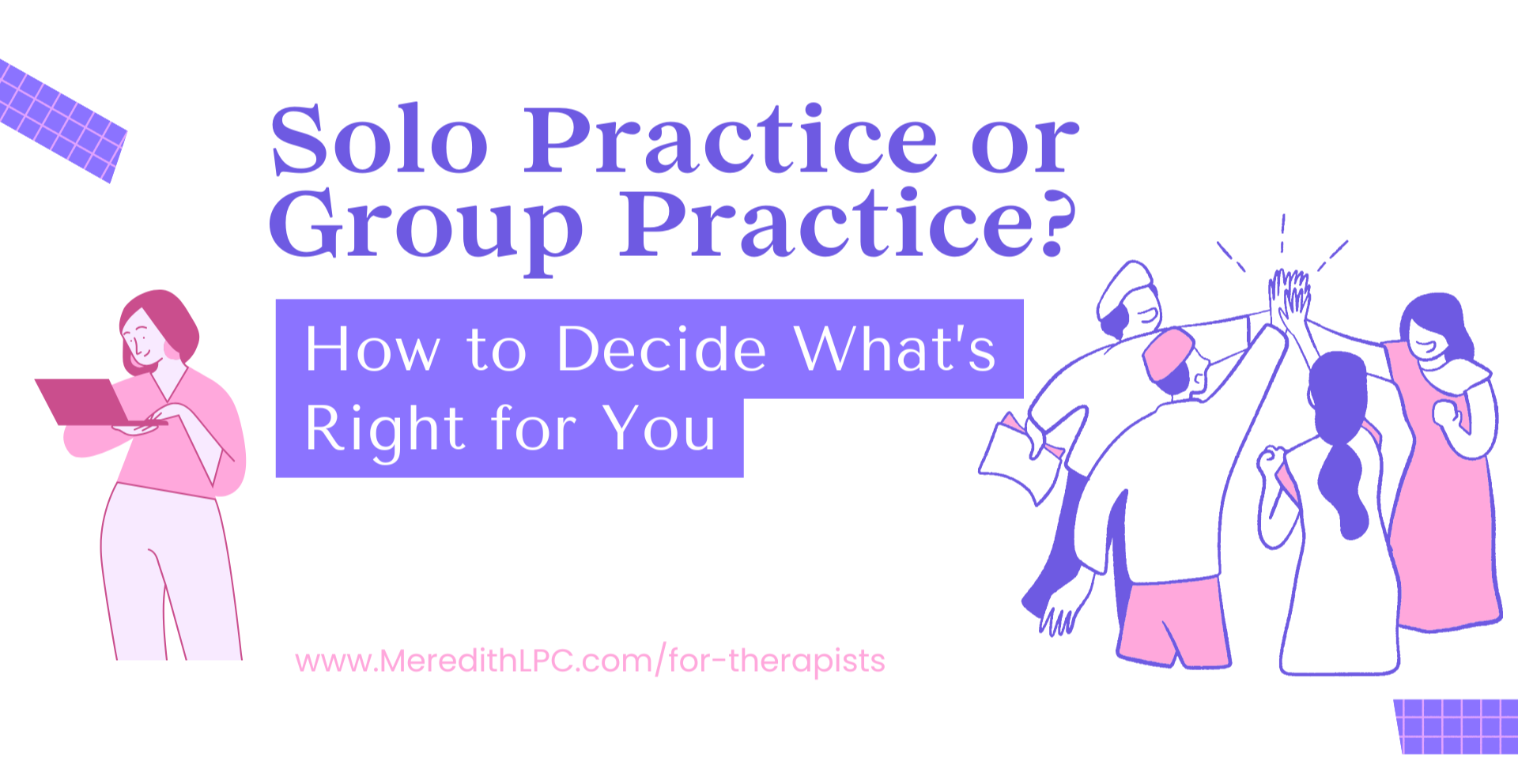Solo Practice or Group Practice? How to Decide What’s Right for You
One of the biggest decisions therapists face after getting their solo private practice off the ground is whether to stay solo or expand by starting a group practice. Both paths offer rewarding opportunities—but they come with very different responsibilities, risks, and rewards.
This guide will help you weigh the pros and cons of staying solo versus starting your own group practice, so you can decide which aligns best with your goals, personality, and lifestyle.
Staying Solo: The Benefits and Challenges
A solo practice means you’re the owner, the clinician, and the decision-maker. You see your own clients, handle business operations (or outsource some of them), and have full control over how your practice runs.
Benefits of Staying Solo:
Full autonomy: You set your own policies, choose your clients, and decide how to run your business.
Lower overhead: With no employees to pay or large office to maintain, your expenses remain relatively low.
Flexibility: You can adjust your schedule, caseload, and business goals as your life changes.
Simplicity: You don’t have to worry about managing other therapists, payroll, or complex HR issues.
Challenges of Staying Solo:
Limited earning potential: Your income is capped by the number of clients you can see yourself.
Isolation: Without colleagues in your practice, it can feel lonely at times.
Wearing all the hats: Even if you outsource some tasks, you’re still ultimately responsible for every part of the business.
For many therapists, staying solo is a great fit—especially if you value independence, prefer to keep things simple, and don’t want the added stress of managing others.
Starting Your Own Group Practice: The Benefits and Challenges
Starting a group practice means building a business where you hire other therapists to work for you under your practice name. You’re no longer just a clinician—you become a business owner and leader of a team.
Benefits of Starting a Group Practice:
Increased revenue potential: Your income is no longer limited to your own clinical hours because you earn from the work of your employees or contractors.
Scalability: With more clinicians and services, your business can grow to serve more clients and generate higher profits.
Team environment: You create a community within your practice, fostering collaboration and support.
Enhanced reputation: Larger practices often have greater visibility and credibility in the community.
Challenges of Starting a Group Practice:
Higher overhead: Salaries, benefits, larger office space, and administrative support increase your expenses.
More responsibility: You’ll be managing people, resolving conflicts, overseeing operations, and ensuring compliance with employment laws and ethical standards.
Less clinical focus: As the owner, much of your time may shift from seeing clients to managing the business and staff.
Risk: Hiring and retaining good staff can be challenging, and turnover can disrupt both finances and morale.
Group practice is a good fit for therapists who are entrepreneurial, enjoy leadership and mentoring, and are motivated to grow a larger business beyond themselves.
Questions to Help You Decide
Before deciding to start a group practice, consider these questions:
Do I enjoy managing and mentoring others?
Am I comfortable delegating and sharing control?
Do I want to spend less time on clinical work and more on business operations?
Am I prepared to take on the financial and legal responsibilities of employing others?
Do I have the vision, systems, and support to sustain a larger business?
If your answers lean toward leadership, growth, and building something bigger than yourself, a group practice might be the right path. If you prefer simplicity, autonomy, and a direct connection to your clients, staying solo may suit you better.
Ready to Build a Private Practice That Works for You?
While my expertise and consultation services are focused on helping therapists grow and thrive in solo private practice, understanding the potential of group practice is an important part of making an informed decision.
If you’re wanting to explore this decision further or need more support as you take the steps to start your own practice, book a consultation today to gain clarity, confidence, and actionable steps to build the private practice that’s right for you.
Related Articles: 5 Fears That Hold Therapists Back from Starting a Private Practice (And How to Overcome Them)
The Best Productivity Tools for Private Practice Therapists (That Actually Make Your Life Easier)
What Paperwork Do You Need to Start a Private Practice?
How to Start a Private Practice Without Feeling Overwhelmed
The Biggest Mistakes Therapists Make When Starting a Private Practice (and How to Avoid Them!)


